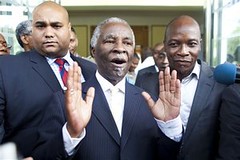
Former South African President Thabo Mbeki was in Ivory Coast in an attempt to reach a negotiated political settlement over who won the recently-held run-off presidential elections.
Originally uploaded by Pan-African News Wire File Photos
By William Wallis in London and Harvey Morris at the UN
December 22 2010 20:14
West African heads of state will meet on Thursday to toughen their response to the crisis in Ivory Coast, where President Laurent Gbagbo continues to defy international pressure to stand down after losing elections.
The UN says Mr Gbagbo, who lost run-off polls last month by a margin of 8 per cent but was declared victor by his allies in the constitutional court, has engaged mercenaries to shore up his presidency and attack civilians and UN peacekeepers.
A senior Nigerian official said toughening sanctions was one option but increasing military intervention would also be tabled during tomorrow’s emergency meeting of Ecowas, the west African regional bloc.
Nigeria, the official said, might be willing to deploy more troops in support of the 10,000-strong UN peacekeeping mission, which has been in Ivory Coast since the 2002-2003 civil war. But they would require international backing and a stronger mandate, he said.
Only the Angolan government, which has strong ties to Mr Gbagbo, was taking a contrarian position, the Nigerian official said.
Alassane Ouattara, a former prime minister and senior International Monetary Fund official, was declared winner of the elections two weeks ago but is holed up in a hotel in Abidjan, the capital, under the protection of peacekeepers.
Guillaume Soro, Mr Ouattara’s would-be prime minister, said on Wednesday: “It is obvious the only solution to the crisis is the use of force.”
He added: “I ask the UN Security Council, European Union and Ecowas to consider the use of force.”
Mr Gbagbo said on Wednesday that he wanted a peaceful resolution and was willing to accept an international review of the results. But regional diplomats and officials rejected the offer as time wasting.
“This only ends with Gbagbo leaving office. No more money is going into Ivory Coast until this is settled,” the official said.
Millions of west African migrants were drawn to the Ivory Coast, the world’s leading cocoa producer, during its more prosperous past, and concerns are growing they will be targeted as violence escalates.
France, the former colonial power, has called on thousands of its citizens to leave the country, fearing a return to civil war.
The EU and US have initiated sanctions against Mr Gbagbo; the African Union and Ecowas have suspended the country; and the West African Central Bank, where Ivory Coast’s reserves are held, is set to transfer authority over accounts to Mr Ouattara.
At least 50 of Mr Ouattara’s supporters have been killed in recent days, and there have been reports of abductions by masked gunmen in Abidjan. The violence is reminiscent of tactics used against anti-Gbagbo activists after a failed coup attempt in 2002 that sparked the civil war.
Mr Gbagbo has called on the UN to withdraw its peacekeepers, but the Security Council on Monday renewed its mandate.
Alain Leroy, head of UN peacekeeping, confirmed the presence of combatants who did not speak local languages, “probably from Liberia and maybe also some from Angola”. He said the mercenaries were being used “to attack and provoke the civilian population and UN personnel”.
Mr Leroy said his peacekeepers’ suppliers had been threatened and that weapons, including AK-47 rifles, had been distributed to the pro-Gbagbo Young Patriots militia.
No comments:
Post a Comment